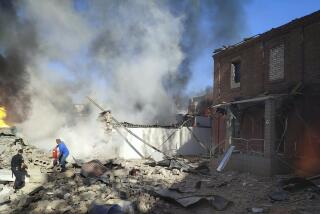Atomic Agency Chief Upbeat on Nuclear Safety : Another Chernobyl Unlikely, Expert Says
- Share via
VIENNA — Safety improvements at nuclear plants around the world could eliminate the threat of accidents like the Chernobyl disaster, Hans Blix, director general of the International Atomic Energy Agency, said here Friday.
In an interview, Blix said that last year’s explosion at the Soviet plant, which spewed radioactivity over Europe and far beyond, had dealt a blow to the nuclear industry but not a fatal one.
“Nuclear power will survive today and expand tomorrow,” he said. Since Chernobyl and a 1979 accident at the Three Mile Island plant in Pennsylvania, public opinion has demanded higher safety standards than in any other industry.
“The nuclear industry is geared to living by the demand that no accident must occur, can occur (or) will be allowed to occur with any significant radioactive releases,” Blix said.
Asked whether this aim could be achieved, he said, “Yes, I think so.” Lessons learned from the two accidents make the chances of a reactor core melting again “a very remote possibility” and the chance of radioactivity escaping into the atmosphere even more distant.
Andy Stirling of the environmental group Greenpeace disagreed that such safety standards are possible. He quoted a commissioner of the U.S. Nuclear Regulatory Commission as writing in a recent magazine article that, given present safety levels, a core meltdown is possible within the next 20 years.
Such an accident could allow as much or more radioactivity to escape into the atmosphere as levels estimated for Chernobyl, Stirling quoted the official as saying.
Safety will be a major theme next week at the Vienna-based International Atomic Energy Agency’s annual general conference, which marks the U.N. organization’s 30th anniversary, but diplomats say it could be overshadowed by a Nigerian-led attempt to suspend South Africa from the agency.
Next Friday, delegates are scheduled to vote on whether to deprive South Africa of its “rights and privileges”--a phrase that effectively means suspending Pretoria from the organization.
The diplomats said many Western nations would back South Africa, arguing that Pretoria should not be excluded from world cooperation to improve safety despite widespread opposition to many of South Africa’s internal policies.
However, the votes of the numerous Third World members could win the two-thirds majority needed to pass the motion.
More to Read
Sign up for Essential California
The most important California stories and recommendations in your inbox every morning.
You may occasionally receive promotional content from the Los Angeles Times.













